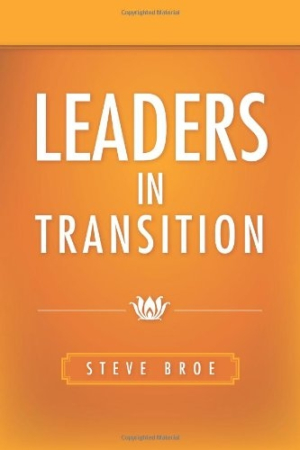Leaders in Transition
In Leaders in Transition, Steve Broe successfully puts a new spin on the oft-covered topic of leadership by addressing it in the context of changing careers.
Broe begins by discussing the “risky world of changing a career and transforming one’s life.” He acknowledges that some individuals are forced into such a shift due to economic conditions, while others actively seek out a career change. Whatever the reason, writes Broe, the career-changer is sure to face uncertainty, financial insecurity, emotional turbulence, self-perception issues, and strained relationships. Still, significant opportunities exist for those who persevere: some career-changers are capable of becoming leaders.
Broe addresses such topics as the skills necessary to become a transformational leader, the five practices of leaders, how to connect with others, the importance of learning, and how to set goals and achieve results. For this volume, Broe interviewed thirty-three leaders to learn how they changed careers and became successful. He incorporates many of these stories into the book, and also includes helpful “tips for leaders” and “lessons for leaders” throughout the text.
One of the more interesting chapters presents an examination of leadership myths—myths that Broe attributes to Bennis and Nanus, authors of the book Leaders. Broe shares his own perspective on such beliefs as “leaders are born” and “leaders are charismatic.” Instead of being stifled by these so-called truths, Broe says the leader should rely on his or her own “well” of experience. “The leader’s previous life is the well,” writes Broe. “Pull deep. A leader may be able to draw lessons about change and people from the lives of other leaders in his teaching lineage.” Broe says his personal well includes guidance from mentors in his own life, as well as insights gained from historical legends like Carl Jung and Leonardo da Vinci.
Leaders in Transition has a dual message: one about changing careers, and the other about becoming a leader. While the two themes are not necessarily at odds, this duality could be confusing to some readers. In addition, although the author refers to himself as “Dr. Steve,” he fails to include a biographical sketch. Knowing Broe’s credentials would be helpful to readers who want validation of the content.
Despite these points, Leaders in Transition is a solid addition to the resources on leadership, and it should be of particular value to readers who are either contemplating or in the midst of a change in careers.
Reviewed by
Barry Silverstein
Disclosure: This article is not an endorsement, but a review. The publisher of this book provided free copies of the book and paid a small fee to have their book reviewed by a professional reviewer. Foreword Reviews and Clarion Reviews make no guarantee that the publisher will receive a positive review. Foreword Magazine, Inc. is disclosing this in accordance with the Federal Trade Commission’s 16 CFR, Part 255.

